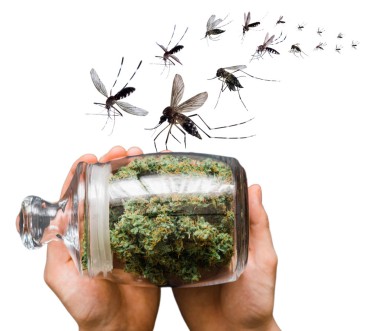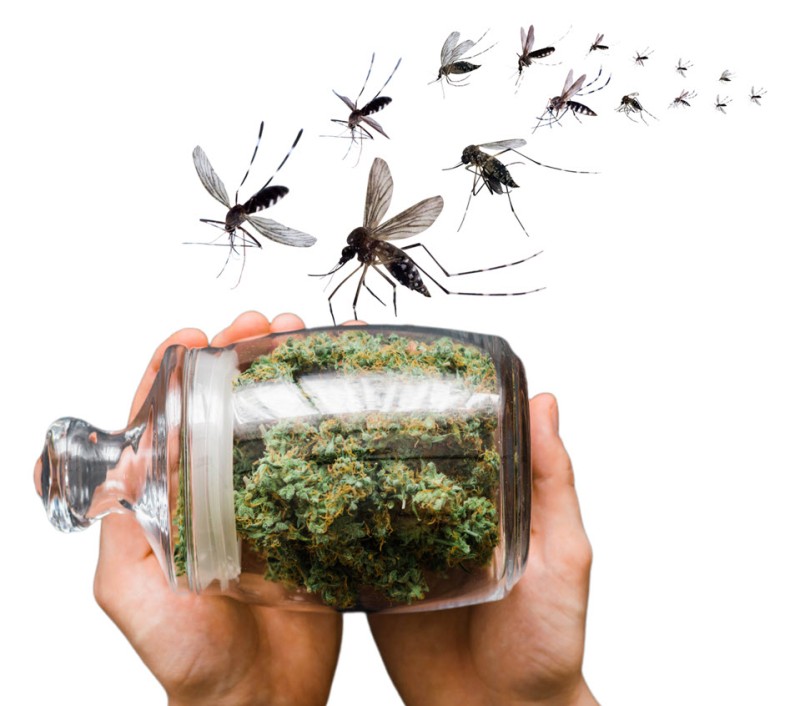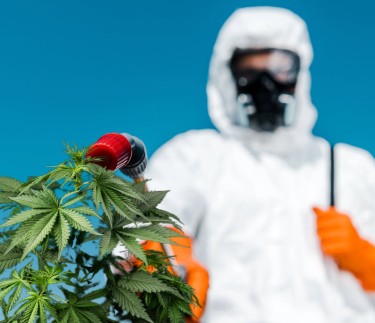
CBD For Pest Control?? New Study Shows CBD Is Effective In Killing Larvae Of Yellow Fever Mosquitoes
Dengue. Chikungunya. Zika virus. Yellow fever. West Nile disease.
If you know what these words mean, you know how much fear these words can incite. All of these words are the names of mosquito-borne diseases that are so dangerous they could be fatal, without early treatment and diagnosis. They can all be transmitted by the yellow fever mosquito, also known as the Aedes aegypti.
Yellow fever mosquitoes can live in any tropical or subtropical, as well as some temperate climates near human residences. There are many ways humans can inhibit the proliferation of these mosquitoes, particularly targeting a reduction or total elimination of eggs and larvae in human dwellings. However, it’s just as important to wear insect repellent too.
Unfortunately, we are yet to find a way to completely eliminate yellow fever mosquitoes. But this may be something that cannabis can help with too. Yes, you read that right: weed!
Cannabidiol (CBD) was recently featured in a publication called Insects documenting a study where hemp-derived CBD was found to be effective in killing yellow fever mosquito larvae. One of these two species studied was resistant to insecticides, yet, the researchers found that using pulverized and air-dried hemp leaves could be used to create a potent methanol concentration. The methanol was eventually removed in order to make it easier to analyze, and it was then fed to the mosquito larvae with its food. Then, it was discovered that the solution could kill these insects in 48 hours.
Erick Martinez Rodriguez, the study’s lead author and an entomology graduate student, told Ohio State News: “Mosquitoes are one of the deadliest animals in the world, mainly because as adults they serve as vectors of disease.”
“If you compare the amount of hemp extract needed to kill 50% of the population to other synthetic conventional insecticides, it is on the high side, but when you compare it side-by-side to other natural extracts we have tested in our lab, only a relatively low amount is required to produce high mortality values in larvae,” Rodriguez disclosed in the interview.
It's also good to note that hemp is a sustainable crop, so compared to other plant-based insecticides, it could be a good choice and produced economically, adds Rodriguez.
“CBD is a compound that appears to be safe for people and our companion animals to ingest,” explains Peter Piermarini, the study’s co-author and an entomology professor at Ohio State University. “It’ll be interesting to learn more about how CBD interacts with various proteins in mammals and insects to understand why it’s safe for people but not insects,” he added.
Other Studies
This isn’t the first time that cannabis has been studied for its potential applications as an insecticide. According to a recent scientific review from researchers at the Universidade do Sul de Santa Catarina together with investigators at the Universidade Estadual de Sao Paolo in Brazil analyzed the impacts of cannabis on the eggs, larvae, pupae, and even adult vector insects including 4 mosquito species and one type of flea using existing studies.
The researchers said the results revealed the potential insecticidal effects of cannabis in the form of nanoemulsions, extracts, and essential oils. “Different cannabis formulations showed an insecticidal effect on the developmental stages of five species of medically important insects,” read the report. “The larval phase was the most studied; it was approached in all the articles reviews and taking into account all the Cannabis formulation formats,” the authors said.
The findings further cement the fact that cannabis should be explored much further as a natural, safe insecticide especially for targeting dangerous insects that can cause life-threatening disease to humans.
“However, we ought to clarify that despite the reported Cannabis insecticidal action on this insect vectors’ stage of development, there are still few studies that have approached the effect of this plant on the vectors’ larval stage that would allow an effective conclusion considering each formulation,” they wrote.
Meanwhile, researchers have also looked into the potential use of cannabis as a pesticide. Cornell University investigators from the School of Integrative Plant Science (Cornell AgriTech’s College of Agriculture and Life Sciences or CALS) discovered that a high concentration of cannabinoids from hemp leaves may have deterred insects chewing it, compared to other leaves that had less cannabinoids.
According to Larry Smart, a CALS professor and plant breeder, there’s a great lack of studies looking into why cannabis plants evolved to contain over 100 unique cannabinoids. “It has been speculated that they are defensive compounds, because they primarily accumulate in the female flowers to protect seeds, which is a fairly common concept in plants,” Smart explained. “But no one has put together a comprehensive set of experimental results to show a direct relationship between the accumulation of these cannabinoids and their harmful effects on insects,” he said.
When Cornell University began their hemp breeding program in 2017, that’s when the researchers observed a strange phenomenon: hemp from Ukraine, which didn’t produce cannabinoids, were far more vulnerable to being eaten by Japanese beetles. However, other hemp varieties that did produce cannabinoids didn’t have the same results. “In the absence of cannabinoids, we saw heavy insect damage, and in the presence of cannabinoids, we saw much less damage,” Smart said.
Conclusion
While we do need more studies on the subject, it’s clear that this is an angle worth exploring. Cannabis and hemp in general have shown to be effective in killing pests, especially the larvae of mosquitoes that transmit potentially fatal diseases. Aside from being effective, cannabis is also a much more cost-effective and environmentally-friendly solution.







